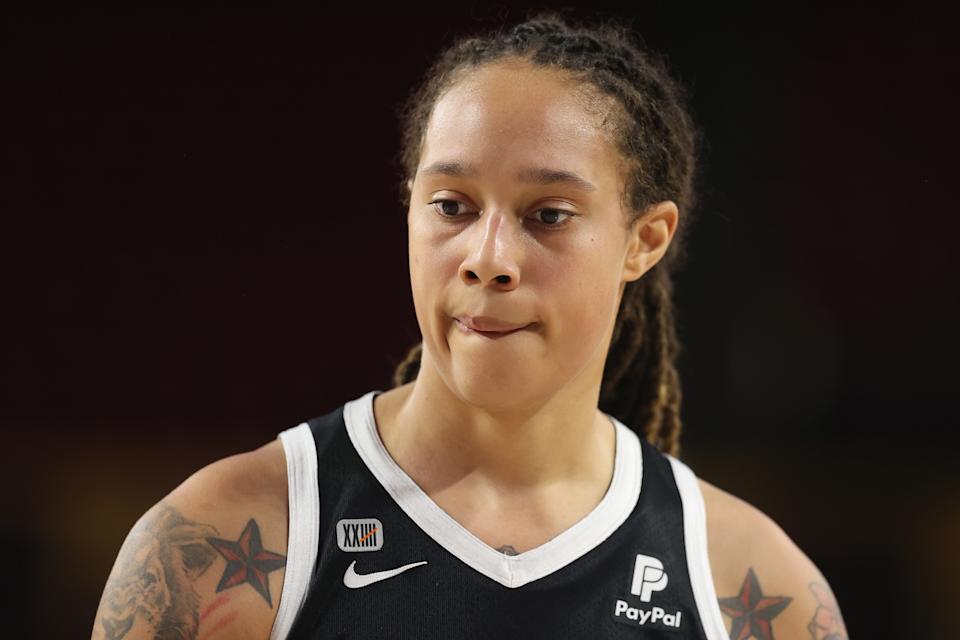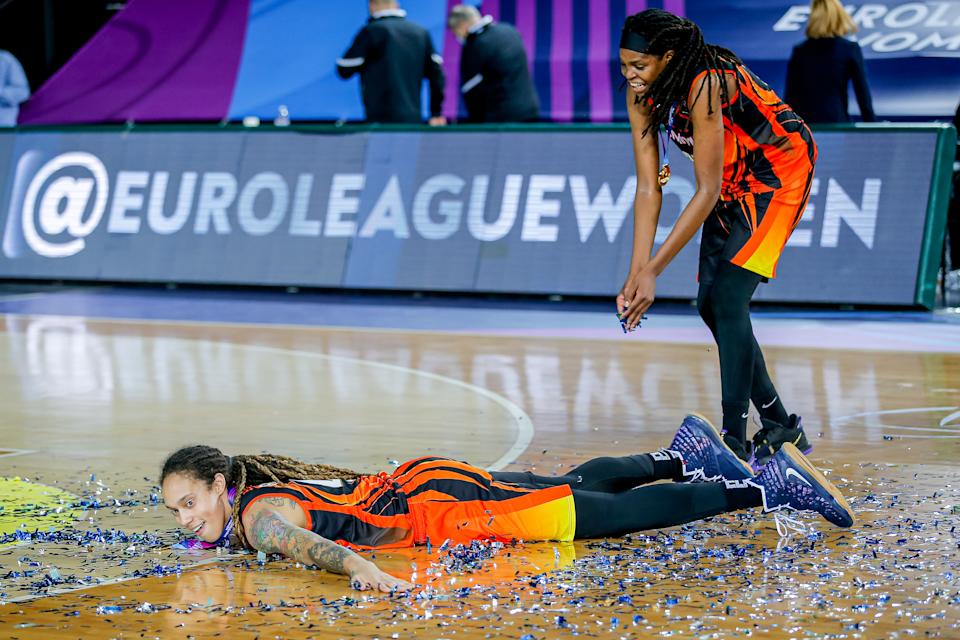In January 2018, hoping to shame those who had benefited from cozying up to Russian President Vladimir Putin, the U.S. released a document informally dubbed the oligarch list. Included were the names of 96 Russian tycoons with a net worth of $1 billion or more.
Two of those oligarchs bankroll the powerhouse Russian women’s basketball club that American Brittney Griner played for from 2015 until her arrest last month. Andrei Kozitsyn and Iskander Makhmudov, the co-founders of the mining company that sponsors UMMC Ekaterinburg, annually use their zinc and copper riches to assemble a roster stacked with WNBA All-Stars and top European talent.
“They might be Griner’s way out of this,” said an agent who represents other top women’s basketball players. “If it were me, I’d be begging them for help.”
Griner is the subject of a drug-smuggling investigation that carries a potential prison sentence of up to 10 years in Russia. When the two-time Olympic gold medalist flew into a Moscow airport last month, Russian authorities arrested her after searching her bags and allegedly finding vape cartridges containing hashish oil.
The timing of Griner’s arrest could entangle her fate in the confrontation between Russia and the West over war in Ukraine. As a former Pentagon official told Yahoo Sports earlier this week, Griner is at risk of going from criminal defendant to “high-profile hostage” if Putin views her as a potential bargaining chip.
While the United States’ deteriorating relationship with Russia may make it difficult for the former Cold War adversaries to broker a deal to bring Griner home safely, her ties to two Russian oligarchs raise another option. Do Kozitsyn and Makhmudov have the clout to intervene on Griner’s behalf? Might they represent her best path to freedom?
Yahoo Sports posed that question this week to three experts in Russian politics. Their answers were a reminder of where the power lies in Putin’s Russia.
“The oligarchs serve at the pleasure of Putin,” McGill University political scientist Maria Popova said.
Or as Konstantin Sonin, a Russian economist at the University of Chicago, put it, “The times when oligarchs could call certain people at the Kremlin or a local court and get what they want are long over.”


Russia’s first wave of oligarchs originally gained that sort of standing during the country’s era of privatization after the collapse of the Soviet Union. In the 1990s, Boris Yeltsin’s administration transferred enormous wealth to a small group of well-connected Russian businessmen by selling off key state-owned assets at bargain prices.
Those oligarchs backed Yeltsin for re-election in 1996, but their campaign contributions and favorable media coverage came at a price. During Yeltsin’s second term, many oligarchs gained political power and wielded vast influence over public policy.
When Putin rose to power following Yeltsin’s 1999 resignation, he sought to consolidate power and re-establish the authority of the Russian state. At first, he launched a series of criminal investigations to apply pressure to some of the Yeltsin-era power brokers. Then, once he had successfully flexed his muscles, Putin essentially offered the remaining oligarchs a tacit deal: The new administration would respect big business and honor past privatization deals if the major tycoons stopped meddling in politics.
“He was really effective in giving that message strongly,” Popova said. “The reality is these people are not very politically powerful anymore. They make a ton of money, but they have been sidelined.”
It’s unclear how close Griner is to Kozitsyn or Makhmudov, but it’s likely they have at least some relationship. Kozitsyn has been UMMC Ekaterinburg’s owner and team president throughout the entirety of Griner’s six-plus seasons with the club.
Griner is one of many American women’s basketball stars who supplement their WNBA salaries by playing overseas during the offseason. Some of the top teams in Europe will pay the world’s best players four or five times as much as the WNBA’s maximum salary of just over $200,000.
UMMC Ekaterinburg has attracted the likes of Griner, Diana Taurasi, Sue Bird and Breanna Stewart over the years because the club pays at a level no one else can match and provides perks like charter flights and personal drivers. In 2015, the Russian club even paid Taurasi to sit out the WNBA season so that when she returned to Ekaterinburg, she’d be healthy and rested.
While the strategy hasn’t filled arenas or resulted in lavish TV contracts, it has helped UMMC Ekatinburg win a lot of games. In the past two decades, the club has captured 15 domestic titles and six EuroLeague championships.
Last spring, after the club’s most recent EuroLeague title, a proud Griner posed for photos with her medal and did snow angels in the confetti. Less than a year later, she finds herself under arrest in a foreign country and isolated from her friends and family.


The way Popova sees it, the oligarchs’ ability to help Griner depends largely on how valuable Putin thinks she is as a bargaining chip. Kozitsyn and Makhmudov can only intervene, Popova said, if Putin deems it unrealistic that he can exchange Griner in a prisoner swap or trade her freedom for other political favors.
“If these oligarchs make calls to law enforcement and law enforcement gets the signal that there is no guidance coming from the Kremlin, then, yes, they might listen,” Popova said. “But given the moment that we are in, I think it is more likely that this does matter to the Kremlin.”
Stanislav Markus, an international business professor at the University of South Carolina, assesses the situation similarly. He describes Makhmudov and Kozitsyn as belonging “to an elite class of Russian oligarchs who do have at least some political power” but nowhere near enough juice to outweigh Putin.
“Of course, nobody knows whether they tried to intervene in this particular case,” Markus said. “But if they did and were unsuccessful, this means that the pressure is coming directly from Moscow.”
It’s difficult to know what, if anything, Griner’s team or its owners are doing to help her. So far they have made no public comment. Even the statement from Griner’s agent and the Instagram posts from her partner have revealed nothing about where she is being held or attempts to get her home.
If Griner had been arrested before tensions between Russia and the U.S. escalated over the assault on Ukraine, Sonin says Kozitsyn or Makhmudov “probably would have been able to get her a good lawyer and make sure that she’s in good conditions in jail.” Now, given the current geopolitical climate, he’s not even sure about that.
“She might have been arrested for the offense that she was charged with, but now any American is a potential target for the Putin government,” Sonin said. “Even if it started as a legitimate drug case, it will now be elevated to the top political level.”
